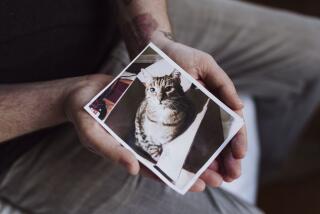With Death Waiting in the Wings, What’s a Body to Do?
- Share via
Gerry Strimling had it all figured out. One or two quick phone calls and everyone would come out a winner. The way Strimling saw it, his wife would be spared the headaches and cost of burying him, and the UC Irvine Medical School would get a bagful of his organs, which, Strimling assumed, would be in great demand.
At least that was the plan until Strimling got on the phone with someone from the school’s donor program and got the idea that UCI would charge him $600 to dispose of his body after it had gathered his organs. To Gerry, the cost sort of defeated the whole purpose.
That’s when the 70-year-old Strimling, racked with emphysema, phoned me and why we were back at the drawing board one morning this week, seated at his kitchen table in Costa Mesa. He thought I could help: “I’ve read your articles through the years. Some are off-the-wall, and some seem to be for causes. It seems when you get something in the paper, people start responding, and I thought you could find out more than I ever could myself.”
With several missing teeth, scraggly beard and tinted glasses, Strimling cuts a striking figure. Plus, I don’t know that I’ve ever met anyone who wore a stocking cap at the breakfast table.
“Does my smoking bother you?” he asked before lighting up a cigarette.
Go ahead, I said.
The first thing he told me was that he is serious about his plan. In fact, he’d just gotten a phone number off of TV, but he missed the name of the organization. “They’re sending me some papers.”
He started hatching his plan about six months ago, he said. “I get Social Security at a very low rate and I didn’t want my wife to have the expense and trouble of a funeral,” he began. “So I began to contact some of the organ donor places. They can use almost the whole body. They use skin and everything. I figured what little there’s left [after taking my organs], they can take and dispose of and it solves a lot of problems, emotionally and monetarily for my wife. The V.A. suggested I call UCI. It took me three days to get a live person. Before that, it was all recordings.”
Once he got through, Strimling got the idea that UCI would charge him $600 to cremate what was left of him after organ removal. “I thought that was outrageous, as much as they’re crying for donors,” he said.
What does he plan to donate? “The whole works,” he said. “Of course, they don’t want the lungs. Everything else seems to work fine, to the best of my knowledge, considering I’m 70 years old.”
Strimling’s plan for the end of his life has another key element. He’s intrigued by the physician-assisted suicide law passed in Oregon and wishes California had it. “I have a pretty good idea what it’s like near the end with emphysema,” he said. “I’ve got to the point where I’m thinking, ‘Why couldn’t we make an appointment at the hospital, go in, have the family there, die in comfort in bed, and then right away, they’ve got you as fresh as possible for the organs?’ ”
Strimling knows that won’t happen in California and, as a result, is considering taking a little exploratory trip up to Oregon.
A truck driver in his working days, Strimling doesn’t know how long he’s got to live but said he can tell he’s weakening. He’s hoping for one more motorcycle trip along old Route 66 and maybe some trips to see old friends.
I left, promising to look into the situation. Late in the day, I had some news for him.
Strimling had misunderstood the information from UCI. Organ donation is free, unless the family wants the remains transported, which Strimling doesn’t. Other than that, said Christopher Brown, director of UCI’s Willed Donor program, the only cost is a nominal fee for a death certificate.
About 300 people annually donate organs to UCI, Brown said, adding that emphysema wouldn’t automatically disqualify anyone from being an organ donor. About 40,000 Americans are waiting for organ transplants and 2,000 are added each month, according to a fact sheet from the UCI program. Acceptable donors range from newborns to people 65 or older.
Strimling was pleased with the news. “Yes, I’m very interested,” he said, when I asked if he wanted to go back to Plan A. He lamented again, however, the unavailability of physician-assisted suicide in California.
And as for death itself? “If you look at it one way,” he said, “it’s life’s greatest adventure. You can’t top it with anything you’ve ever tried to do.”
Dana Parsons’ column appears Wednesday, Friday and Sunday. Readers may reach Parsons by calling (714) 966-7821 or by writing to him at the Times Orange County Edition, 1375 Sunflower Ave., Costa Mesa, CA 92626, or by e-mail to dana.parsons@latimes.com
More to Read
Sign up for Essential California
The most important California stories and recommendations in your inbox every morning.
You may occasionally receive promotional content from the Los Angeles Times.













